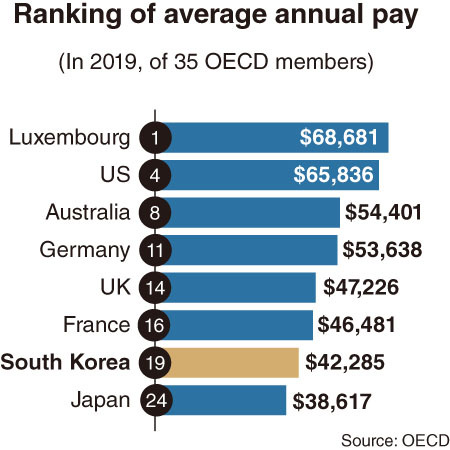 |
Headquarters of the Organization for Economic Cooperation and Development in Paris (OECD) |
SEJONG -- The average annual wage for South Korean workers was found to have reached $42,285 last year, according to calculation by the Organization for Economic Cooperation and Development.
The level placed Korea at No. 19 among 35 members of the OECD. Two member countries, Colombia and Turkey, were not in included in the 2019 comparison.
Though the figure fell short of the OECD average, $48,587, Korea ranked above Israel (21st), Italy (22nd), Spain (23rd) and Japan (24th), all of which saw their yearly payouts to employees on average post under $40,000. The figure for Japan stood at $38,617.
According to the OECD’s definition, average wages are calculated by dividing the national-accounts-based total wage bill by the average number of employees in the total economy, which is then multiplied by the ratio of the average usual weekly hours per full-time employee to the average weekly hours for all employees.
Korea placing higher than Japan and some European economies could be attributable to the drastic hikes in minimum salary in 2018 and 2019 under the Moon Jae-in administration.
 |
(Graphic by Kim Sun-young/The Korea Herald) |
On the basis of monthly payouts, the nation’s minimum salary climbed 29 percent over the two years -- from 1.35 million won ($1,140) in 2017 to 1.74 million won in 2019.
As of 2019, the minimum wage per annum came to 20.94 million won for regular jobs.
The so-called income-led policy has caused some side effects involving small businesses’ huge burden for labor costs and tough job market for the young generation in the wake of more owners’ reluctance to hire.
According to the Supplementary Index for Employment III, published by Statistics Korea, the tally for de facto unemployment -- unemployed plus underemployed -- for those aged 15-29 reached about 1.21 million among the extended-based economically active population of 4.86 million as of August 2020.
The de facto jobless rate among youth reached 24.9 percent, which indicates that 1 in 4 young Koreans are unemployed or underemployed (not in a regular job status) currently, though the novel coronavirus worsened the situation this year.
In contrast, advocates claim that the income-led policy has benefited the quality of life and the consumption of ordinary households. They also argue the policy was helpful in terms of easing the formerly serious income polarization.
Among the 35 members, Luxembourg topped the list as its average wage reached $68,681, followed by Iceland with $68,006 and Switzerland with $66,567. These are also three of the top five countries in the world ranking of GDP per capita.
The US ranked 4th in the yearly wage ranking with $65,836, followed by Denmark with $57,150, the Netherlands with $56,552, Belgium with $55,590, Australia with $54,401, Norway with $54,027 and Austria with $53,903.
The top ten was followed by Germany with $53,638, Canada with $53,198, Ireland with $50,490, the UK with $47,226, Sweden with $46,695, France with $46,481, Finland with $45,698 and New Zealand with $44,031.
All of the 18 OECD members ranked above South Korea are classified as developed economies in the global stage.
By Kim Yon-se (
kys@heraldcorp.com)






![[Exclusive] Hyundai Mobis eyes closer ties with BYD](http://res.heraldm.com/phpwas/restmb_idxmake.php?idx=644&simg=/content/image/2024/11/25/20241125050044_0.jpg)
![[Herald Review] 'Gangnam B-Side' combines social realism with masterful suspense, performance](http://res.heraldm.com/phpwas/restmb_idxmake.php?idx=644&simg=/content/image/2024/11/25/20241125050072_0.jpg)

